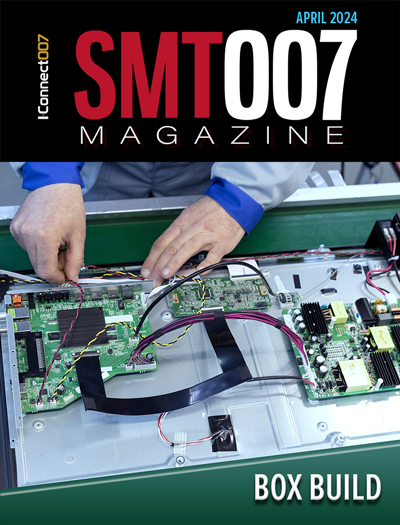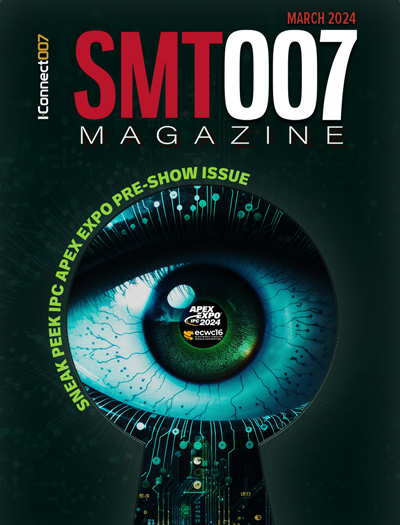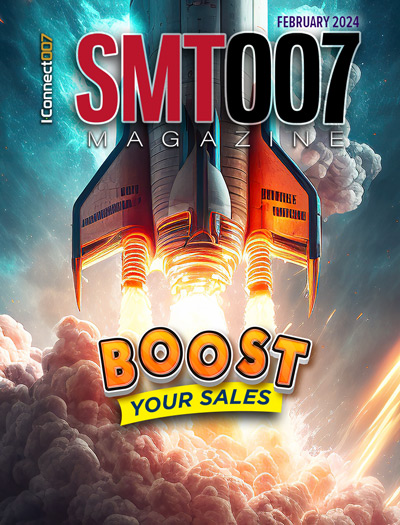-

- News
- Books
Featured Books
- smt007 Magazine
Latest Issues
Current Issue
Box Build
One trend is to add box build and final assembly to your product offering. In this issue, we explore the opportunities and risks of adding system assembly to your service portfolio.

IPC APEX EXPO 2024 Pre-show
This month’s issue devotes its pages to a comprehensive preview of the IPC APEX EXPO 2024 event. Whether your role is technical or business, if you're new-to-the-industry or seasoned veteran, you'll find value throughout this program.

Boost Your Sales
Every part of your business can be evaluated as a process, including your sales funnel. Optimizing your selling process requires a coordinated effort between marketing and sales. In this issue, industry experts in marketing and sales offer their best advice on how to boost your sales efforts.
- Articles
- Columns
Search Console
- Links
- Events
||| MENU - smt007 Magazine
Navigating the Supply Chain Storm with ICAPE
December 8, 2021 | Barry Matties, I-Connect007Estimated reading time: 5 minutes
Guillaume Chauvet of ICAPE Group, vice president of sales-Americas East, discusses managing the supply chain through transportation issues, raw material shortages, and longer production times. He also details how he helps customers manage different suppliers and divergent technologies.
Barry Matties: Guillaume, would you give us a better understanding of how your company operates?
Guillaume Chauvet: The company was created by Thierry Ballenghien. He had managed PCB shops in France, and in 1999 he saw the PCB business going to China, but it was complicated to go there. French people didn’t have strong ties to Asia, so it was a really good spot for him to open a company, to buy PCBs directly from Taiwan and China with our own qualified supplier, and then sell them in France. That’s how we started: by qualifying a PCB shop in Asia and creating more business in France.
It was quite successful. At that time, everyone tried to go to China, but it’s not easy when you don’t know the business, how to qualify PCB shops, etc. PCBs are very technical. Now it’s a bit different. It’s easy to buy from Asia, people are used to it, the quality is quite good, and there are many PCB experts there.
In 2004, Thierry opened a new company called CIPEM, which was doing more or less the same as ICAPE but for custom parts like harnesses, coils, and metal parts. There are custom parts that were easier to buy in China and were sometimes a better price. The target is to sell more product to our customers. We were selling PCBs to some contract manufacturers, and we said, “You have trouble finding good suppliers for the harnesses, so let us provide them for you. We have solutions for you.” It was really to upsell the existing customers.
As we’ve grown, we have opened a big office and lab in China to control the quality of our Asian suppliers. Now we also have inspectors in the factory who just check the quality of the product directly out of the lines. We send the product to the lab to validate the sample before the customer receives the boards.
The target was a long-term strategy—to sell everywhere in the world. We are opening new offices all the time. We started in the United States in 2015, but we are increasing. We have representatives in most European countries, in Brazil, Mexico, and Canada, but also in Japan, Thailand, India, Malaysia, China, Hong Kong, and South Africa.
Matties: It looks like your revenue has grown substantially since that first five million euro. You have over 450 people and 20 business units, correct?
Chauvet: I think now we have more than 500 employees.
Matties: Fantastic. You been with ICAPE since April 2020, at the beginning of the pandemic; that’s a tough time to start.
Chauvet: It was really tough. I’m French, but I was living in Estonia. I used to work for a contract manufacturer, and I knew some people, so we contacted each other, and they said that there was a really nice opportunity in the U.S. I was stuck in Europe, but I was able to travel and move to the U.S. in November. I worked remotely for quite a long time from Europe.
Matties: I’m certainly glad we’re getting a chance to chat today. Let’s start with the supply chain. Obviously, that’s the big topic right now.
Chauvet: It’s a big topic. For two years, we have had many supply chain issues. We had COVID, but every year we have the Chinese New Year and that creates a big impact on PCB manufacturing. Most Taiwanese and Chinese partner factories closed for over a month, so we needed to be sure that the PCBs were shipped before Chinese New Year. It took a while to get it restarted, and when I started working for ICAPE Group, we had transportation issues. Air travel was just impossible during COVID. Even now, the customer doesn’t really know when he will get the components, so they are pushing out or pulling in the components, and it creates big, complicated problems for our partner factories and takes more time for us to manage the inventory.
We have ships that are blocked, and the docks in the U.S. are full. It seems like we always have a new issue. It’s so important to secure the supply chain and to put stock in Asia when the PCBs are built. The best plan for us is to stock the PCBs at our warehouse in Indianapolis, which we are expanding to allow for more storage. We have a shortage of raw material, so the lead time went from eight to 16 weeks on some part numbers.
My goals have been to form partnerships. We cannot put in stock unless we find solutions with the customers, so we discuss the options. We see how we can secure the visibility or not, and just propose different solutions. One solution is consignment. We pushed to get more vendor-managed inventory (VMI), which means they get a forecast, we have some contracts, and we try to keep a certain level of stock inside our warehouse.
Matties: Now the work that you do is made-to-order.
Chauvet: Right. We only do custom parts. Therefore, it’s more complicated for us and it’s why the customer needs to secure this part—they cannot find it off the shelf. We try to store parts here in Indianapolis or secure the raw material so the shop can build the boards when they need to. Currently, there is a lot of allocation in the raw materials, so some raw materials are extremely tough to get. Transportation and raw materials are complicated.
The shops don’t know when they will get the raw material, so they are replanning their schedules all the time and creating a low efficiency for manufacturing.
To read this entire conversation, which appeared in the December 2021 issue of SMT007 Magazine, click here.
Suggested Items
KIC’s Miles Moreau to Present Profiling Basics and Best Practices at SMTA Wisconsin Chapter PCBA Profile Workshop
01/25/2024 | KICKIC, a renowned pioneer in thermal process and temperature measurement solutions for electronics manufacturing, announces that Miles Moreau, General Manager, will be a featured speaker at the SMTA Wisconsin Chapter In-Person PCBA Profile Workshop.
The Drive Toward UHDI and Substrates
09/20/2023 | I-Connect007 Editorial TeamPanasonic’s Darren Hitchcock spoke with the I-Connect007 Editorial Team on the complexities of moving toward ultra HDI manufacturing. As we learn in this conversation, the number of shifting constraints relative to traditional PCB fabrication is quite large and can sometimes conflict with each other.
Standard Of Excellence: The Products of the Future
09/19/2023 | Anaya Vardya -- Column: Standard of ExcellenceIn my last column, I discussed cutting-edge innovations in printed circuit board technology, focusing on innovative trends in ultra HDI, embedded passives and components, green PCBs, and advanced substrate materials. This month, I’m following up with the products these new PCB technologies are destined for. Why do we need all these new technologies?
Experience ViTrox's State-of-the-Art Offerings at SMTA Guadalajara 2023 Presented by Sales Channel Partner—SMTo Engineering
09/18/2023 | ViTroxViTrox, which aims to be the world’s most trusted technology company, is excited to announce that our trusted Sales Channel Partner (SCP) in Mexico, SMTo Engineering, S.A. de C.V., will be participating in SMTA Guadalajara Expo & Tech Forum. They will be exhibiting in Booth #911 from the 25th to the 26th of October 2023, at the Expo Guadalajara in Jalisco, Mexico.
Intel Unveils Industry-Leading Glass Substrates to Meet Demand for More Powerful Compute
09/18/2023 | IntelIntel announced one of the industry’s first glass substrates for next-generation advanced packaging, planned for the latter part of this decade.


